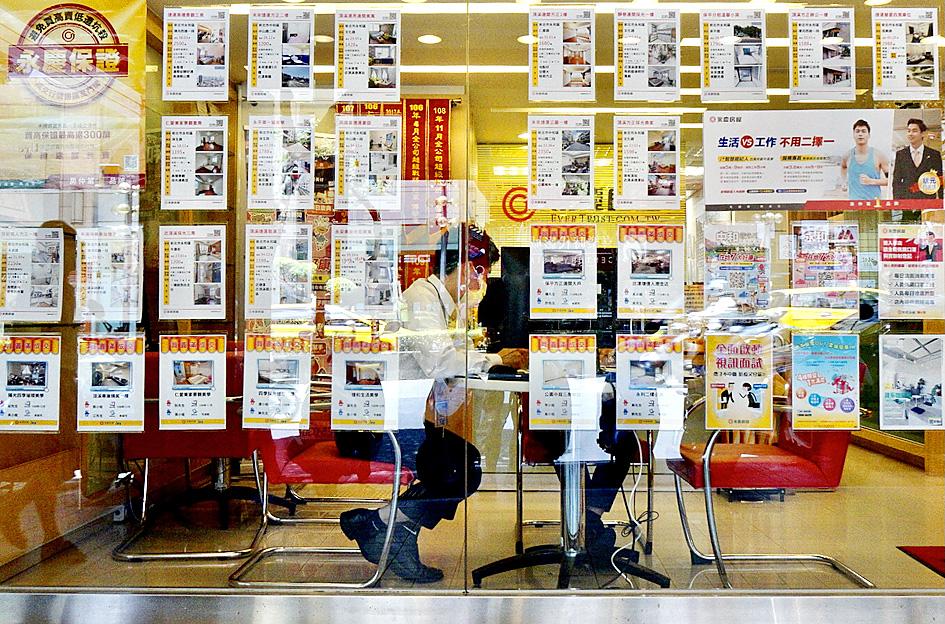Most Taiwanese companies remain positive about the property market and plan to raise their stakes in it in the coming 12 months, a survey released yesterday by Colliers International Taiwan (高力國際) showed.
“Eighty-five percent of respondents held positive views, although most put off investment amid the virus outbreak,” the local branch of the Canadian company said.
Sixty-six percent said they intended to increase their stake in the market and 80 percent believed property prices would remain stable, it added.

Photo: Peter Lo, Taipei Times
Colliers Taiwan surveyed domestic developers, life insurance companies, asset management companies, hotels and manufacturers, as well as influential families and individuals.
Plots of land topped the list for potential investments, followed by office spaces with stable rent incomes and industrial factories, the survey said.
Rent rates are generally expected to increase modestly in the next two years, but a severe lack of supply in popular locations could slow the pace of transactions, it said.
The COVID-19 pandemic is reshaping people’s lifestyles and giving birth to a stay-at-home economy highlighted by online shopping and remote working, Colliers Taiwan said.
The trend has been fueling demand for warehousing and logistics services, making related properties attractive investment targets, the consultancy said.
Taiwan’s low birthrate and aging population are lending support to investments in retirement housing and urban renewal projects, it said.
Interest in retail spaces and hotel buildings has taken a back seat as the sectors have been hit by border controls and movement restrictions during the COVID-19 pandemic, it said.
Developers and life insurance companies are the most avid investors and would take action after the COVID-19 crisis is over, Colliers Taiwan said.
Interest rate hikes and credit controls could affect investment decisions, it added.
The central bank last week left interest rates unchanged at its quarterly board meeting.
Monetary authorities might leave things unchanged for quite a while in the absence of major inflation risks, it said.

South Korea’s equity benchmark yesterday crossed a new milestone just a month after surpassing the once-unthinkable 5,000 mark as surging global memory demand powers the country’s biggest chipmakers. The KOSPI advanced as much as 2.6 percent to a record 6,123, with Samsung Electronics Co and SK Hynix Inc each gaining more than 2 percent. With the benchmark now up 45 percent this year, South Korea’s stock market capitalization has also moved past France’s, following last month’s overtaking of Germany’s. Long overlooked by foreign funds, despite being undervalued, South Korean stocks have now emerged as clear winners in the global market. The so-called “artificial intelligence

‘SEISMIC SHIFT’: The researcher forecast there would be about 1.1 billion mobile shipments this year, down from 1.26 billion the prior year and erasing years of gains The global smartphone market is expected to contract 12.9 percent this year due to the unprecedented memorychip shortage, marking “a crisis like no other,” researcher International Data Corp (IDC) said. The new forecast, a dramatic revision down from earlier estimates, gives the latest accounting of the ongoing memory crunch that is affecting every corner of the electronics industry. The demand for advanced memory to power artificial intelligence (AI) tasks has drained global supply until well into next year and jeopardizes the business model of many smartphone makers. IDC forecast about 1.1 billion mobile shipments this year, down from 1.26 billion the prior

Chinese artificial intelligence (AI) start-up DeepSeek’s (深度求索) latest AI model, set to be released as soon as next week, was trained on Nvidia Corp’s most advanced AI chip, the Blackwell, a senior official of US President Donald Trump’s administration said on Monday, in what could represent a violation of US export controls. The US believes DeepSeek will remove the technical indicators that might reveal its use of American AI chips, the official said, adding that the Blackwells are likely clustered at its data center in Inner Mongolia, an autonomous region of China. The person declined to say how the US government received

People stand in a Pokemon store in Tokyo on Thursday. One of the world highest-grossing franchises is celebrated its 30th anniversary yesterday.